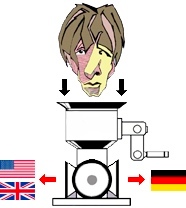| Các trang trong chủ đề: [1 2] > | Poll: Do you like post-editing projects? Người gửi thông tin lên tuyến đoạn: ProZ.com Staff
|
|---|
| |
Like? What is there to like? So far, I haven’t been offered any PEMT jobs, but I doubt that I would say yes as I’m very selective regarding proofreading/revision projects...
| | | | neilmac
Tây Ban Nha
Local time: 17:54
Spanish to English
+ ...
| It depends... | May 28, 2019 |
I think it depends on how you define or conceive of PEMT. Whoever posted the query, and, I imagine, many of those who respond, will think of it as mainly an outrage, perpetrated by unscrupulous agencies or cheapskate clients. However, a sizeable percentage of my work consists of revising and correcting articles for publication written in English by non-native speakers. Nowadays, they are obviously using any tools they can find, including machine translation programs, usually Google. So, I'm obvi... See more I think it depends on how you define or conceive of PEMT. Whoever posted the query, and, I imagine, many of those who respond, will think of it as mainly an outrage, perpetrated by unscrupulous agencies or cheapskate clients. However, a sizeable percentage of my work consists of revising and correcting articles for publication written in English by non-native speakers. Nowadays, they are obviously using any tools they can find, including machine translation programs, usually Google. So, I'm obviously "post editing" texts which have "benefited" from MT. In this particular case, it's not an issue from where I'm standing.
However, I'd be wary of any PEMT requests coming from agencies or unknown potential clients. ▲ Collapse
| | | | Muriel Vasconcellos (X) 
Hoa Kỳ
Local time: 08:54
Spanish to English
+ ...
I've been post-editing for over 30 years. My client pays very well and the MT system is quite good. Still, I much prefer translating from scratch.
| | |
|
|
|
| Yes, but only for one client | May 28, 2019 |
I only do post-editing for a long-term client, who is very serious so I gave it a try. It turned out that they use efficient programs: the original translation is usually good, and in the end it pays more than a regular proofreading or translation so I am happy with it. It's a bit challenging though (or fun! depending how you look at it), as the errors identified are very different from those of a human translator.
It happened only once that the translation was a real disaster but I mentio... See more I only do post-editing for a long-term client, who is very serious so I gave it a try. It turned out that they use efficient programs: the original translation is usually good, and in the end it pays more than a regular proofreading or translation so I am happy with it. It's a bit challenging though (or fun! depending how you look at it), as the errors identified are very different from those of a human translator.
It happened only once that the translation was a real disaster but I mentioned it and they had no problem to pay the regular fee of a transation from scratch. ▲ Collapse
| | | |
The post-editing projects I have done have been far more time-consuming than translating from scratch, and for far less money.
| | | | Samuel Murray 
Hà Lan
Local time: 17:54
Thành viên kể từ 2006
English to Afrikaans
+ ...
Yes, I like it because it is a challenge to turn the machine translated text into an adequate translation with as few edits as possible. However, I don't often do such jobs because for some odd reason clients seem to believe that they should pay much, much less for it than for straight translation.
| | | | Mar Brito 
Vương Quốc Anh
Local time: 16:54
Thành viên kể từ 2015
English to Spanish
+ ...
| Yes, but only for certain clients | May 28, 2019 |
I have been post-editing for two of my long-standing clients for a couple of years now, only technical texts and the machine output is truly very good, it pays better than normal proofreading and it requires minimal work on my end. I wouldn't do it all day long and I much prefer translating from scratch, but I don't mind having one or two PEMT projects in the pipeline.
| | |
|
|
|
Jan Truper 
Đức
Local time: 17:54
English to German
(I assume the question is referring to post editing of machine translation.)
I am generally an early adopter and I welcome technological advances, but MT does not increase my productivity if I want to maintain my usual quality.
One of my main areas of work is translation of dialogue sections for games.
Usual work flow:
1) I read the source sentence
2) I translate it in my mind
3) I type/dictate my translation
MTPE workflow:... See more (I assume the question is referring to post editing of machine translation.)
I am generally an early adopter and I welcome technological advances, but MT does not increase my productivity if I want to maintain my usual quality.
One of my main areas of work is translation of dialogue sections for games.
Usual work flow:
1) I read the source sentence
2) I translate it in my mind
3) I type/dictate my translation
MTPE workflow:
1) I read the source sentence
2) I translate it in my mind
3) I read the machine-translated sentence
4) In my head, I compare my version with the MT version and have to gauge whether to
5a) select all, delete, type/dictate my translation -- (i.e., MT has slowed me down)
5b) fix the MT version in various places -- (i.e., MT does not or only slightly increase my productivity)
5c) take the MT version as a whole -- (i.e., MT makes me faster)
I have tried MT extensively, and variant C is rare. All in all, a workflow involving MT just means that I will spend about the same or even more time, brain power and manual effort.
Consequently, I find the argument that MTPE should be remunerated at a lesser rate than regular translation quite ludicrous. ▲ Collapse
| | | | Samuel Murray 
Hà Lan
Local time: 17:54
Thành viên kể từ 2006
English to Afrikaans
+ ...
Jan Truper wrote:
MTPE workflow:
1) I read the source sentence
2) I translate it in my mind
3) I read the machine-translated sentence
4) In my head, I compare my version with the MT version and...
I find that to be an odd way of doing it. Here's what I do:
1. I read the machine translation to see if I there are any grammar, syntax or spelling errors. Some types of errors typically do not relate to mistranslations, but others do, so I first fix the ones that are not likely related to mistranslations.
2. I then compare the machine translation word-for-word or phrase-for-phrase with the source text, to see if there are any translation errors (i.e. I ask myself if the translation says what the source text says). If there are errors, I fix them.
3. Sometimes step 1 and 2 take place simultaneously, particularly if I see an error that is likely due to mistranslation, then I might glance up to the source text quickly to see if I've guessed correctly.
The above workflow applies to post-editing jobs.
I have a different workflow for MT-assisted human translation, because in human translation I'm not required to make as few edits as possible and I can freely disregard anything that the machine translation suggests.
Samuel
[Edited at 2019-05-28 10:29 GMT]
| | | | Jan Truper 
Đức
Local time: 17:54
English to German
Samuel Murray wrote:
I have a different workflow for MT-assisted human translation, because in human translation I'm not required to make as few edits as possible and I can freely disregard anything that the machine translation suggests.
Samuel
I guess my little rant was more about MT-assisted human translation (I do not offer strict MTPE as a service).

| | | | Christine Andersen 
Đan Mạch
Local time: 17:54
Thành viên kể từ 2003
Danish to English
+ ...
| It makes a difference when it has been past a human... | May 28, 2019 |
neilmac wrote:
I think it depends on how you define or conceive of PEMT. Whoever posted the query, and, I imagine, many of those who respond, will think of it as mainly an outrage, perpetrated by unscrupulous agencies or cheapskate clients. However, a sizeable percentage of my work consists of revising and correcting articles for publication written in English by non-native speakers. Nowadays, they are obviously using any tools they can find, including machine translation programs, usually Google. So, I'm obviously "post editing" texts which have "benefited" from MT. In this particular case, it's not an issue from where I'm standing.
However, I'd be wary of any PEMT requests coming from agencies or unknown potential clients.
It makes an enormous difference whether the odd phrase has been translated to help a human who is in principle writing the text from scratch, or whether you are asked to post-edit directly from pure MT. I don't do a lot of editing any more, but to answer the original poll question, no I do NOT like post-editing MT!
MT calls for a completely different approach, I feel, and I have never managed to learn it. I make every effort when translating to get things right first time, which means understanding the text and finding the correct expression in the target language. The algorithm and probability method simply does sound idiomatic enough, I find.
OK, some of my own work suffers from source interference, but there you go. I look for it and work at it, and I know some of the worst pitfalls!
______________________
Way back in another life, I worked on a project with PRE-editing text for computer searching. Abstracts of technical literature in libraries had to contain the appropriate keywords, so that the computers of the day could find them. It was an electronic advance on manual card indexes and peek-a-boo systems, which were simply becoming too large and unwieldy for humans to handle reliably! We wrote abstracts of 100-500 words, only a tiny percentage of the full length of the book or article, in a very disciplined form. But if you eliminate all the repetitions and selected the right keywords, it might be quite useful if carefully translated and fed into a Translation Memory.
I still wonder whether pre-editing would be an advantage, but it would probably be impractical with the vast quantities of literature involved. I don't suppose it will really happen, and it would probably not be any easier than post-editing.
| | |
|
|
|
Angus Stewart 
Vương Quốc Anh
Local time: 16:54
French to English
+ ...
I don't like PEMT projects, because it is like proofreading a lazy non-native speaker of the target language who hasn't bothered to do any terminology research for the trickier terms, particularly the acronyms, leaving me to do the time consuming, laborious work.
| | | | Adam Warren 
Pháp
Local time: 17:54
Thành viên kể từ 2005
French to English
| Jan Truper's and Samuel's workflow analyses are very helpful | May 28, 2019 |
Thank you both, Jan and Samuel. If I may, I'll refer to them both if I'm offered MTPE work that I can take on.
With kind regards,
Adam Warren (IanDhu - translator 41189)
[Edited at 2019-05-28 13:24 GMT]
| | | | Adam Warren 
Pháp
Local time: 17:54
Thành viên kể từ 2005
French to English
| I am deterred by a colleague's experience in the EU | May 28, 2019 |
He pointed to a high staff turnover in MT post-edit work, due to brain wear and tear. He said that people worked on post-edit for two or three years, and then moved on for sheer weariness. I wouldn't want to be tied to it alone, and I am not sure what is a fair charging basis. As another contributor commented here, agencies, in particular, tend to use us translators as cheap labour, particularly in MTPE.
| | | | | Các trang trong chủ đề: [1 2] > | To report site rules violations or get help, contact a site moderator: You can also contact site staff by submitting a support request » Poll: Do you like post-editing projects? | Protemos translation business management system | Create your account in minutes, and start working! 3-month trial for agencies, and free for freelancers!
The system lets you keep client/vendor database, with contacts and rates, manage projects and assign jobs to vendors, issue invoices, track payments, store and manage project files, generate business reports on turnover profit per client/manager etc.
More info » |
| | TM-Town | Manage your TMs and Terms ... and boost your translation business
Are you ready for something fresh in the industry? TM-Town is a unique new site for you -- the freelance translator -- to store, manage and share translation memories (TMs) and glossaries...and potentially meet new clients on the basis of your prior work.
More info » |
|
| | | | X Sign in to your ProZ.com account... | | | | | |







































